The Bagpipe Society
Piping Report of the 3rd International Bagpipe Conference
On Saturday morning, just as people were arriving, Thodoris, one of the volunteers, walked up to me and whispered: “Wow! I had no idea Andy Letcher was such a rock star!” This is what the International Bagpipe Conference is about: putting faces to names (sometimes they look like proper rock stars), meeting new people, creating contacts and having a piping time.
This year’s International Bagpipe Conference was held at the National Piping Centre in Glasgow. Initial talks with The National Piping Centre started back in 2012 after the first International Bagpipe Conference in London. After a few meetings with Roddy MacLeod and James Beaton, respectively the Principal and Librarian of the Centre, we decided to go ahead and thus started a new collaboration. Both were enthusiastic from the start and keen to work together, demonstrating interest for the ongoing international bagpipe movement.
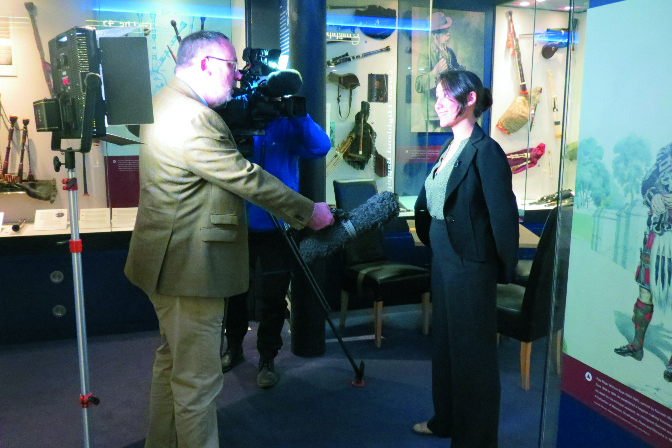
This year’s conference was even more ambitious than the previous two. Building on their success, we decided to hold it over two days. Over the course of the year, we were greatly supported by several people. Much credit goes to Vivien Williams who did a fantastic job promoting the conference to the media as well as to her students at Glasgow University. Additionally, Helen Wilkinson and Lindsey Ellis were extremely helpful with the financial and marketing aspects of the conference right up the day itself.
The conference’s extended programme also meant that the budget was slightly heftier this time round and I am eternally grateful to the different societies and organisations who supported this event financially and morally and without whom this conference would not have been possible. For the third time running, the Bagpipe Society awarded us a generous grant and lots of help to spread the message. The William Grant and Sons Foundation also provided us with a generous grant and we were very grateful for their support. Both English and Scottish piping societies have provided us much needed help including the Lowland and Border Pipers’ Society, The Northumbrian Piping Society, The Piobaireachd Society, The Royal Scottish Pipers’ Society and the Traditional Music Forum.
Finally, the conference would not have been possible without the help of the Programme Committee members, Josh Dixon, Andy Letcher, and Susana Moreno who were presented with the difficult task of choosing the selected papers out of all the abstract proposals. I would also like to thank the many volunteers who gave their help willingly: Andrew Bova, Callum Edwards, Christian Gamauf, Fangsi Yuan and Thodoris Ziarkas.
The Opening Concert (Friday 26 February)
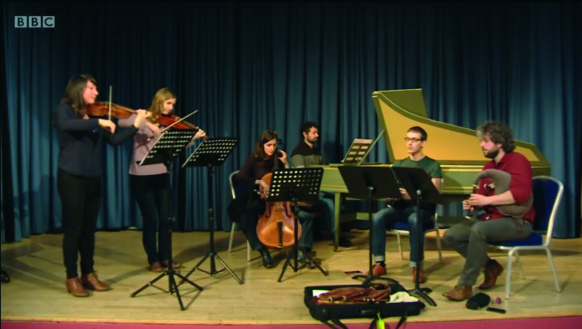
As usual, the conference was opened by an inaugural concert, showcasing local and international pipers. This year, the concert was dedicated to the memory of Jean-Christophe Maillard, a fantastic piper and scholar who presented at IBC 2014 in London. His passing in July 2015 was a shock to the whole community and leaves a huge gap in the baroque musette scene. I specifically commissioned the Belgiam baroque ensemble Bourdon Collectief to play in his memory with Bart van Troyen and Pieterjan van Kerckhoven on the baroque musette. Both former students of JeanChristophe Maillard’s colleague and 12
friend Jean Pierre van Hees, they regaled us with the delicate sounds of the musette, accompanied by strings and harpsichord. Before Bourdon Collectief, the concert was opened by NPC Principal Roddy MacLeod, MBE, also one of the finest Great Highland Bagpipe players in Scotland today.

The second half of the concert was opened by the Kaynak Pipe Band, three fantastic kaba gaida players from the Rhodhope Mountains who positively amazed the audience from the moment they set their drones into action. A 14minute suite of tunes ensued, veritably piercing the soul of every person present in the audience. Finally, the concert was closed by the Scott Wood trio with a short but energetic set with pipes, fiddle and guitar, properly showing off the virtuosity of the Great Highland Bagpipes.
The Conference Day 1 (Saturday 27 February)

The conference started on Saturday morning with single reed pipes. First, we heard Viktor Levytskyi about the Ukranian bagpipes as he showed us many of his filmed interviews with old players. Cvetelin Andreev, one of the kaba gaida players at the concert, then explored different ornamentations for the Rhodopian bagpipe with the help of Kostadin Gerdzhikov. I was struck by the fact that at the highest level of bagpipers were wedding musicians and that stage performers only came second. Karl Partridge, well known for his article on Maltese bagpipes co-written with Peter Cooke and Frank Jeal for the Galpin Journal in 1977, showed us precious footage of zaqq players in the 1970s, marking the huge ornamentation difference with pipers who had taken up the practice in recent years.
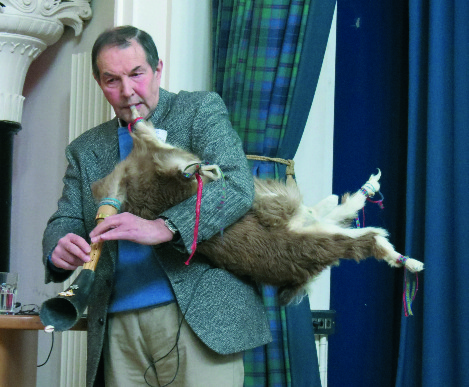
After a short tea break, Nada Gitto explored the practice of the zampogna in southern Italy with many pictures from her fieldwork and Susana Moreno gave us an original account of bagpipe tuition in Lisbon, a city usually known for fado. After a delicious lunch provided by the National Piping Centre, we moved to the British Isles. Paul Roberts presented a compelling case concerning the Lincolnshire, Lancashire and Scotch bagpipes in the seventeenth century before Ciarán MacMurchaidh delighted us with bagpipe stories in the Irish press during the nineteenth century. Just before the tea break, Roger Landes presented his research on the English bagpipe revival, naming many of the people in the room and providing an interesting insight from an outsider’s point of view.
After a well-deserved coffee break, Pete Stewart and Julian Goodacre launched their bagpipe mapping website (don’t hesitate to add your contributions!) before we heard three talks centred on the Great Highland Bagpipes in very different contexts. First, Simon McKerrell lectured on the value of piping today before Andy Clarke demonstrated the close relationship between pipe-bands and working class societies set up by local industries. The decline of the latter, he argued, affected access to music through piping for many people. Finally, Hannah Marsden explored the use of the Great Highland Bagpipes in a ritual context in London, as the instruments were used by an Indian community to please their religious leader.
The Social Evening (Saturday 27 February)
After Saturday evening’s dinner, the National Piping Centre’s hall transformed into a dance hall as young Glaswegian musicians regaled us with a ceilidh, followed by a ‘Bring your own Bagpipe’ session, a title imagined by Vivien Williams from Glasgow University. The South-Western French contingent (Yan Cozian, Jean-Michel Espinasse and, of course, Ian Clabburn) opened the session with a couple of songs before handing over to the rest of the pipers. We made the most of the cheap (and excellent) whiskey while we listened to Andy 14
May on the Northumbrian Pipes, Jon Swayne and Andy Letcher pipe a duet, quite a few border pipe tunes, a baroque musette duet by our Belgian representatives, a Highland Bagpipe demonstration that nearly turned into a diplomatic incident, Mallorcan xeremies by Llorenc Guasp, a short Galician medley played with melodeon player Owen Woods and of course our usual Bagpipe Society hit, Callum Armstrong with his techno bagpipes.
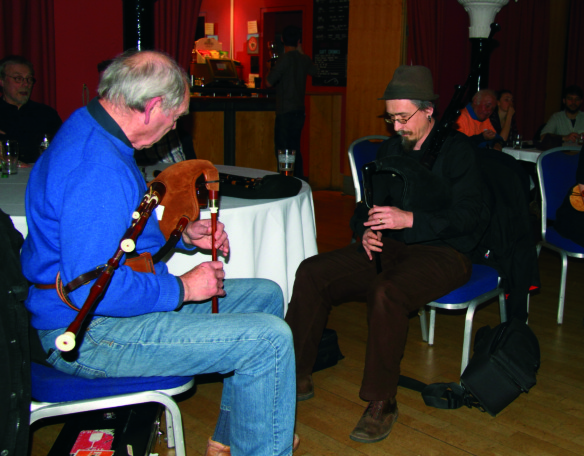
The Conference Day 2 (Sunday 28 February)
Sunday morning also provided a wide variety of papers. Jean-Michel Espinasse and Yan Cozian talked about the boha, the Gascon bagpipes, and explained how the denomination of their bagpipes was crucial to its identity. Jack Taylor from the Piobaireachd Society compellingly explained what a piobaireachd entailed and certainly changed my vision of the genre completely. Just before the tea break, bagpipe expert Jean-Pierre van Hees presented his work on the baroque musette. With his lifelong friend and colleague Jean Christophe Maillard in mind, he showed us impressive slides about the internal mechanism of this complex bagpipe. After the tea break, the last two talks were devoted to Poland. Ewelina Grygier played us many recordings from archival sources before film-maker Mariusz Raniszewski showed us a film showcasing the Polish bagpipes in a more modern setting, exploring the revival of the instrument. The morning ended with a concert in memory of Roderick Cannon who was crucial in the inauguration to three bagpipe societies over the years. Three musicians represented them: Pete Stewart for the Lowland and Border Pipers’ Society, Jon Swayne for the Bagpipe Society and Jack Taylor for the Piobaireachd Society.
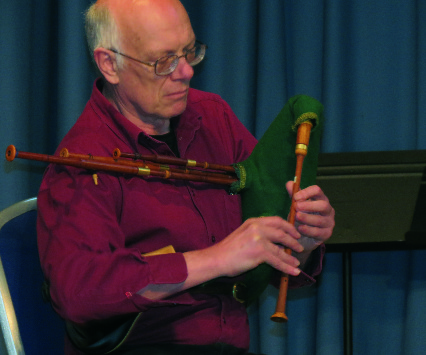
Final words
Overall, the conference was once again a great success. Attracting up to 100 people (including staff, volunteers and speakers), there were lively exchanges and discussions all throughout both days and I can really say that the bagpiping world truly feels like a community, wherever one comes from. Alongside the International Bagpipe Conference, the Traditional Music Forum ran a parallel session reflecting on teaching and learning Traditional Scottish Music, an event that brought a few extra curious people as well as being of interest to many IBC delegates. The national media was once more heavily involved with features appearing on BBC radio and BBC television as well as the newspapers (The Times and even the Sunday Mail, both thanks to Vivien Williams). Overhearing conversations and talking to people during the tea breaks, I was happy to see that people were mingling and sharing their piping news and tips. This year, the conference attracted a number of non-pipers who I hope will want to join our wonderful world as soon as they can.
Overall, this year’s event was a great success as a wide variety of international scholars, musicians, instrument makers and enthusiasts gathered around the topic of bagpipes once again. The next edition will once again coincide with International Bagpipe Day. It will be held on 9-11 March 2018 in.. Mallorca! Co-organised with C·ndid Trujillo and with the help of Toni Torrens, we have already started to book venues. So bring your sunglasses and your pipes; we’ll provide the drinks and the straws! Until then, Long Live the Bagpipes!
By Balosso-Bardin, Cassandre Stewart, Pete Trad
From Chanter Summer 2016.
- Andreev, Cvetelin
- Armstrong, Callum
- Cannon, Roderic D
- Cannon, Roderick
- Clabburn, Ian
- Cozian, Yan
- Espinasse, Jean-Michel
- Gerdzhikov, Kostadin
- Goodacre, Julian
- Landes, Roger
- Letcher, Andy
- Macmurchaidh, Ciarán
- Maillard, Jean-Christophe
- Partridge, Karl
- Roberts, Paul
- Stewart, Pete
- Swayne, Jon
- Swayne, Jonathan
- Van Hees, Jean Pierre
- Van Hees, Jean-Pierre
- Van Kerckhoven, Pieterjan
- Van Troyen, Bart
- Data Processing Notice (GDPR)
-
@BagpipeSociety on X (formally known as Twitter)
-
TheBagpipeSociety on Instagram
-
 BagpipeSociety on Facebook
BagpipeSociety on Facebook
Something wrong or missing from this page? Let us know!
